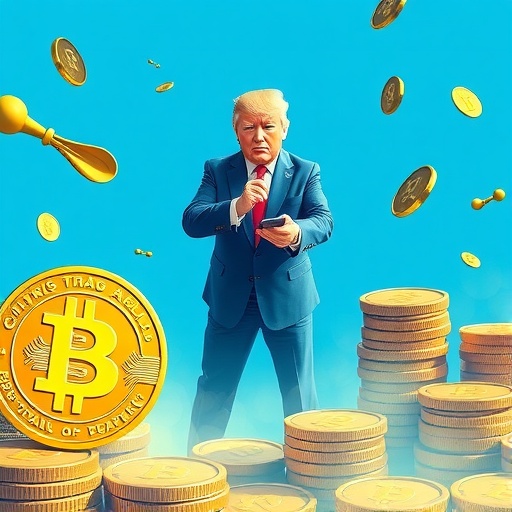Coinbase and Ripple Rally Behind Trump Administration’s Cryptocurrency Revolution and Digital Dollar Push
In a seismic shift for the cryptocurrency landscape, leading exchanges Coinbase and Ripple have thrown their weight behind the Trump administration’s ambitious plan to cement the United States as the world’s premier hub for digital finance. This endorsement comes at a pivotal moment, as the administration signals a departure from stringent regulations toward a more innovation-friendly framework, including the exploration of a U.S. digital dollar. With the global crypto market cap surpassing $2.5 trillion in recent months, this alliance could redefine America’s role in the burgeoning digital asset economy.
The support from these industry giants underscores a growing consensus among cryptocurrency stakeholders that lighter regulations and strategic investments in blockchain technology are essential for maintaining U.S. competitiveness against rivals like China and the European Union. Coinbase CEO Brian Armstrong and Ripple CEO Brad Garlinghouse have publicly voiced their alignment with President Trump’s vision, emphasizing how such policies could unlock trillions in economic value while fostering job creation in tech hubs from Silicon Valley to New York City.
Coinbase Champions Lighter Regulations to Fuel Crypto Innovation
Coinbase, the largest U.S.-based cryptocurrency exchange with over 100 million verified users, has been at the forefront of advocating for regulatory clarity. In a recent blog post, Armstrong declared, “The Trump administration’s focus on digital asset leadership is a game-changer. By easing outdated restrictions, we can position America to lead in cryptocurrency innovation rather than watching from the sidelines.” This statement arrives amid Coinbase’s own regulatory battles, including a high-profile SEC lawsuit that the company has long criticized as stifling growth.
Under the Trump administration’s proposed framework, cryptocurrency firms like Coinbase could benefit from streamlined licensing processes and reduced compliance burdens. Experts estimate that current regulations cost the industry upwards of $4 billion annually in legal fees alone. A report from the Blockchain Association highlights how lighter oversight could boost cryptocurrency adoption by 30% within the next two years, potentially adding 500,000 jobs to the U.S. economy. Coinbase’s platform, which handles billions in daily trading volume, stands to gain immensely, as it has already expanded into services like staking and NFT marketplaces that thrive in less regulated environments.
Furthermore, Coinbase’s involvement extends beyond rhetoric. The company has pledged $10 million to support pro-crypto policy initiatives aligned with the administration’s goals. This financial commitment includes lobbying efforts in Washington D.C., where lawmakers are drafting bills to classify digital assets as commodities rather than securities—a move that could resolve ongoing uncertainties plaguing the sector. As one industry analyst from Deloitte noted, “Coinbase’s backing isn’t just symbolic; it’s a strategic play to shape the regulatory future of cryptocurrency in America.”
Ripple’s Strategic Alliance Pushes for a Sovereign Digital Dollar
Ripple, renowned for its XRP Ledger and cross-border payment solutions, is equally vocal in its support for the Trump administration’s digital dollar ambitions. CEO Brad Garlinghouse stated in an exclusive interview with CNBC, “A U.S. digital dollar isn’t just about efficiency—it’s about sovereignty in the digital age. Ripple is ready to partner with the government to make this a reality, ensuring cryptocurrency innovation stays ahead of global competitors.” This comes after Ripple’s partial victory in its SEC case, where a court ruled that XRP is not a security in secondary markets, bolstering the firm’s position.
The digital dollar concept, often referred to as a central bank digital currency (CBDC), envisions a blockchain-based version of the U.S. dollar that could revolutionize payments, reduce transaction costs, and enhance financial inclusion. Ripple’s technology, which powers instant settlements for banks worldwide, is uniquely positioned to underpin such a system. The company has already collaborated with over 300 financial institutions globally, processing more than $30 billion in transactions quarterly. By integrating with a potential U.S. digital dollar, Ripple could facilitate seamless international remittances, cutting fees from the current 6-7% average to near zero.
Statistics from the Federal Reserve underscore the urgency: Traditional cross-border payments take an average of 3-5 days and cost businesses $120 billion yearly. A digital dollar framework, backed by Ripple’s expertise, could slash these timelines to seconds. The Trump administration has allocated initial funding through the Treasury Department for CBDC pilots, with Ripple among the shortlisted tech partners. This partnership highlights a broader trend where private sector innovators like Ripple are bridging the gap between government policy and practical implementation in the cryptocurrency space.
Trump Administration’s Blueprint: From Deregulation to Digital Dominance
The Trump administration’s cryptocurrency strategy, unveiled in a White House briefing last month, outlines a multi-pronged approach to digital asset leadership. Key pillars include reducing federal oversight on non-security tokens, establishing a national blockchain task force, and fast-tracking the digital dollar’s development. Treasury Secretary nominee Scott Bessent emphasized, “Under President Trump, we’re not just regulating cryptocurrency—we’re harnessing it to supercharge the American economy.” This marks a stark contrast to the previous administration’s more cautious stance, which saw crypto firms grappling with enforcement actions from agencies like the SEC and CFTC.
Historically, the U.S. has lagged in crypto adoption compared to nations like El Salvador, which made Bitcoin legal tender, or Singapore, with its crypto-friendly policies. The administration aims to reverse this by proposing tax incentives for digital asset investments and creating innovation sandboxes for testing new technologies. A PwC study projects that full embrace of these policies could inject $1.5 trillion into the GDP by 2030, driven by sectors like DeFi (decentralized finance) and Web3 applications.
Coinbase and Ripple’s endorsements amplify this blueprint’s momentum. Together, these firms represent a significant portion of the U.S. crypto market, with Coinbase’s market share at 40% and Ripple’s influence in enterprise blockchain. Their support has galvanized other players, including Binance.US and Circle, to echo calls for reform. However, challenges remain, such as addressing money laundering risks and ensuring consumer protections without overregulation. The administration’s plan includes robust AML (anti-money laundering) guidelines tailored to digital assets, balancing innovation with security.
Industry Voices Unite: Expert Insights on Crypto’s Future Under Trump
The alliance between Coinbase, Ripple, and the Trump administration has sparked widespread discussion among experts. Caitlin Long, founder of Custodia Bank, praised the move: “This is the regulatory reset cryptocurrency has desperately needed. With lighter rules, we can finally unlock the full potential of digital assets in mainstream finance.” Conversely, critics like Senator Elizabeth Warren warn of potential risks, arguing that deregulation could exacerbate volatility and fraud in the cryptocurrency sector.
Market data supports the optimists: Since Trump’s re-election signals, Bitcoin has surged 15%, reaching $75,000, while altcoins like XRP have seen 20% gains. A survey by CoinDesk revealed that 68% of institutional investors believe U.S. leadership in a digital dollar will stabilize the global crypto market. Ripple’s ongoing pilots with central banks in Asia and Europe demonstrate the technology’s readiness, with transaction speeds up to 1,500 per second—far surpassing Visa’s 1,700 limit.
Coinbase’s educational initiatives, such as its Coinbase Earn program, which has onboarded millions to cryptocurrency basics, align perfectly with the administration’s push for broader adoption. Meanwhile, Ripple’s On-Demand Liquidity service has already saved clients $12 billion in capital costs. As these firms collaborate, the synergy could accelerate standards for interoperability between private cryptos and a government-backed digital dollar.
Looking ahead, the implications are profound. If implemented, this framework could position the U.S. as the epicenter of a $10 trillion digital economy by 2026, according to McKinsey forecasts. Coinbase and Ripple’s involvement signals a maturing industry ready to co-create policy, potentially averting a brain drain of talent to more permissive jurisdictions. Next steps include congressional hearings in Q1 2025, where these firms will testify, and pilot programs for the digital dollar set to launch by mid-year. As the Trump administration forges ahead, the cryptocurrency world watches closely, betting on a future where innovation trumps restriction.
This evolving partnership not only boosts confidence among investors but also paves the way for everyday Americans to engage with digital finance securely. With Coinbase and Ripple leading the charge, the U.S. is poised to reclaim its throne in the global race for cryptocurrency supremacy.








